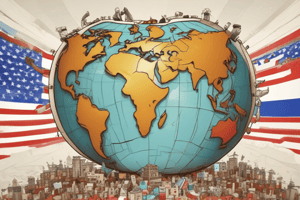Podcast
Questions and Answers
What does internal sovereignty refer to?
What does internal sovereignty refer to?
- The geographic space in which sovereignty is exercised
- The recognition of a state's authority by external actors
- The capacity of a political system to implement its rules and policies within its territory (correct)
- The total population residing within the state's borders
Which of the following best describes external sovereignty?
Which of the following best describes external sovereignty?
- The physical land and resources controlled by a state
- The acknowledgment of a state's existence and authority by other states (correct)
- The democratic processes within a governmental system
- The ability to control the internal affairs of a region
What elements comprise the territory of a state?
What elements comprise the territory of a state?
- Only the land within the borders of a state
- Only the inhabitants and cultural aspects of a state
- The economic resources available to a state
- The terrestrial, fluvial, aerial domains, and other submarine areas (correct)
In political science, the term 'people' is most closely associated with which concept?
In political science, the term 'people' is most closely associated with which concept?
What is a defining characteristic of federalism?
What is a defining characteristic of federalism?
What is the primary focus of Comparative Politics?
What is the primary focus of Comparative Politics?
Which subdiscipline of Political Science addresses issues like terrorism and piracy?
Which subdiscipline of Political Science addresses issues like terrorism and piracy?
Political Theory primarily examines which of the following?
Political Theory primarily examines which of the following?
Which field of Political Science examines the motivations behind governmental policies?
Which field of Political Science examines the motivations behind governmental policies?
What does sovereignty refer to in Political Science?
What does sovereignty refer to in Political Science?
Political Behavior focuses on which of the following aspects?
Political Behavior focuses on which of the following aspects?
In democratic systems, what is the primary aim of the government?
In democratic systems, what is the primary aim of the government?
Which of the following describes the definition of politics in Political Science?
Which of the following describes the definition of politics in Political Science?
Which subdiscipline of anthropology focuses on the biological development and variation of humans?
Which subdiscipline of anthropology focuses on the biological development and variation of humans?
What does Applied Anthropology primarily aim to achieve?
What does Applied Anthropology primarily aim to achieve?
Which approach in anthropology is concerned with the examination of a society's culture, belief systems, and practices?
Which approach in anthropology is concerned with the examination of a society's culture, belief systems, and practices?
Which of the following best describes the focus of Linguistic Anthropology?
Which of the following best describes the focus of Linguistic Anthropology?
Who is credited with founding the discipline of Sociology?
Who is credited with founding the discipline of Sociology?
What is the primary focus of Sociology as a discipline?
What is the primary focus of Sociology as a discipline?
Which of the following best defines 'Social Interaction' in a sociological context?
Which of the following best defines 'Social Interaction' in a sociological context?
What does the concept of Social Organization refer to?
What does the concept of Social Organization refer to?
Flashcards are hidden until you start studying
Study Notes
Subdisciplines of Anthropology
- Archaeology: Studies remains of ancient populations to understand human adaptation and development.
- Applied Anthropology: Applies anthropological theories to solve contemporary issues.
- Cultural Anthropology: Analyzes a society's culture through its beliefs, practices, and material possessions.
- Linguistic Anthropology: Investigates language's role in shaping culture among specific groups.
- Physical Anthropology: Focuses on human biological development and variations in contemporary populations.
Sociology Overview
- Definition: Scientific study of society, patterns of social relationships, interactions, and culture.
- Founding Figure: Auguste Comte coined the term in 1838 and is recognized as the "Father of Sociology".
Key Social Concepts
- Society: Formed through human interactions and cultural rules, providing a sense of belonging.
- Social Interaction: Encompasses the ways individuals engage with others within a societal framework.
- Social Organization: Describes the interrelationships between various societal components, structured into layers.
Political Science Subdisciplines
- Political Theory: Explores the application of political concepts such as human rights, justice, and equality.
- Comparative Politics: Provides context for differences in various governments and political systems.
- International Relations: Studies interactions between states and impacts of globalization, including terrorism and democratization.
- Political Behavior: Analyzes individual attitudes and actions influenced by government policies and political environments.
- Public Policy: Investigates the motivations behind government policies and their implementation.
Key Political Science Concepts
- Politics: Activities related to decision-making within groups and power dynamics involving resource distribution.
- Government: Manages state affairs and allocates resources, aiming to enhance public welfare in democratic systems.
- Sovereignty: The ability of a political system to make independent decisions; divided into internal (local authority) and external (recognition by others).
- Territory: Geographic scope where a state exercises its sovereignty, including land, water, and airspace.
- People: Central element of the state, forming the basis for concepts like government and sovereignty; synonymous with a nation.
Contemporary Issues in Political Science
- Federalism: A governance model combining federal and regional governments to distribute power.
- Social Inequality: Examines causes and factors contributing to social stratification.
- Ethnographic Research: Discusses challenges and advantages in a globalized context.
Studying That Suits You
Use AI to generate personalized quizzes and flashcards to suit your learning preferences.




